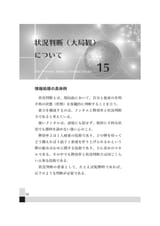Search Results
6/21/2025, 10:16:31 AM
>Chapter 15
>Situation awareness
>An example of information processing
>Situation awareness means the ability to objectively judge the different players' conditions and identify who has the advantage and who doesn't.
>Your mahjong powerlevel is determined by your mental fortitude, tile efficiency, and situation awareness.
>A strong mental game means that even when you get unlucky or are in a bad situation, you don't tilt out and find the best way to move forward.
>Tile efficiency is the ability to know the best discard route to tenpai in any given hand. In a way it can be considered a "one man mahjong" skill, and it is most useful for offence. It's about equally as important as
>To explain situation awareness in more detail, it involves answering questions. When you get your haipai, you need to answer the following questions:
>Declare kyuushuu or aim for kokushi?
>Can this haipai win? Do I go full efficiency, or should I keep defence in mind?
>What yaku can I aim for? Do I try for any of them?
>Should I strike a balance and switch to offence or defence based on later developments?
>In the midgame the questions will be these. You only have a few seconds to answer them.
>How fast are my opponents advancing?
>Should I push into this riichi?
>What are the odds that opponent X is yamiten?
>If he is, what is his hand value likely to be?
>Is it acceptable to deal into it, considering the current point spread?
>In what value range is it still fine to deal in?
>Do I open or do I stay closed?
>Should I let my opponents call or should I try to hold tiles they want to call?
>Do I riichi?
>Should I go for mawashi here or should I just fold?
>How many tiles can I push from dama?
>What are the dangerous tiles?
>Do I take tenpai or not?
>When having a choice of which wait to take, which one is best?
>Situation awareness
>An example of information processing
>Situation awareness means the ability to objectively judge the different players' conditions and identify who has the advantage and who doesn't.
>Your mahjong powerlevel is determined by your mental fortitude, tile efficiency, and situation awareness.
>A strong mental game means that even when you get unlucky or are in a bad situation, you don't tilt out and find the best way to move forward.
>Tile efficiency is the ability to know the best discard route to tenpai in any given hand. In a way it can be considered a "one man mahjong" skill, and it is most useful for offence. It's about equally as important as
>To explain situation awareness in more detail, it involves answering questions. When you get your haipai, you need to answer the following questions:
>Declare kyuushuu or aim for kokushi?
>Can this haipai win? Do I go full efficiency, or should I keep defence in mind?
>What yaku can I aim for? Do I try for any of them?
>Should I strike a balance and switch to offence or defence based on later developments?
>In the midgame the questions will be these. You only have a few seconds to answer them.
>How fast are my opponents advancing?
>Should I push into this riichi?
>What are the odds that opponent X is yamiten?
>If he is, what is his hand value likely to be?
>Is it acceptable to deal into it, considering the current point spread?
>In what value range is it still fine to deal in?
>Do I open or do I stay closed?
>Should I let my opponents call or should I try to hold tiles they want to call?
>Do I riichi?
>Should I go for mawashi here or should I just fold?
>How many tiles can I push from dama?
>What are the dangerous tiles?
>Do I take tenpai or not?
>When having a choice of which wait to take, which one is best?
Page 1
